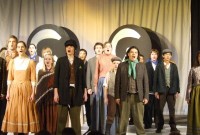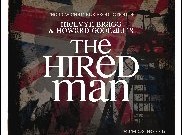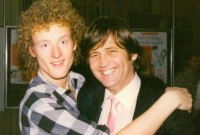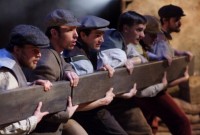A Hired Man miscellany
In 1904 the British population was about 44 million, of which 1.25 million were seriously wealthy, 3.75 million were ‘comfortably off’ middle class. The remaining 38 million were desperately poor. Infant mortality in 1900 was 153 in every 1000 babies born (compared with 19 in 1000 in 1965), life expectancy for men in 1900 was 46, women 50.
Agricultural decline was such that whilst in 1800 half the population of the UK were country-dwellers, by 1911 four out of five Britons lived in towns or cities.
A Whippet is produced by crossing a greyhound and a terrier.
At the turn of the 19th/20th centuries there were 7 twice-yearly hiring fairs in Cumberland. The Fairs date back to medieval times and are known in some areas of Britain as Mops, as Feeing Markets in Scotland, as Statices in Yorkshire and Lancashire, Statchets in some Midland towns (both corruptions of ‘statute fair’). As bond of the verbal agreement between employer and worker, a shilling, or half-crown, often called a fest or fastening penny was given. Children as young as 10 or 11 offered themselves up for service. Workers might wear on their best clothing some insignia of their trade, such as wool, a broom, whipcord, etc.
Cumberland-Westmoreland-style wrestling is alleged to have been left in Britain by the Romans. The two opponents crouch crab-like against each other, swinging up for a grip against the other’s back, which once held, signifies the start of the contest. The bout is won by breaking one’s opponent’s grip.
Wellington Pit, sunk on the southern shore of the harbour at Whitehaven, was built by the Lowther family to resemble a castle. An explosion on11 May 1910, caused by methane gas, led to the immolation of 137 miners, including several teenage boys.
Further along the Whitehaven coast lay William Pit, often described as the most dangerous mine in Britain was fully operational from 1812 until 1955. A disaster on 15 August 1947 killed 104 miners.
An explosion at Hulton Pretoria Colliery, Lancashire, in 1910 killed 344 men, at Senghenydd, Glamorgan in 1913 killed 439, at Gresford, Denbighshire in 1934 killed 265 and West Stanley, County Durham in 1909 killed 168.
Off the Cumbrian coast some pit seams were mined 4 miles out under the sea.
“It is impossible to watch the ‘fillers’ at work without feeling a pang of envy for their toughness. It is a dreadful job that they do, an almost superhuman job by the standards of an ordinary person. For they are not only shifting monstrous quantities of coal, they are also doing it in a position that doubles or trebles the work. They have got to remain kneeling all the while – they could hardly rise from their knees without hitting the ceiling – and you can easily see by trying it what a tremendous effort this means.” George Orwell, The Road to Wigan Pier.
In the 1880’s came a shift in policy of the miners’ unions. For many years they had been tied to a sliding scale, so that wages rose and fell with the price of coal: but in the 1880’s this proved disastrous to their fortunes as the price of coal fell heavily. The county unions lost many of their members, and by 1887 the prospects for mining unionism seemed grim. In 1888, however, Ben Pickard of Yorkshire rallied as many county unions as he could for an overall 10% wage demand, and was surprisingly successful. The result was the foundation in 1889 of the Miners Federation of Great Britain, a body to which most of the miners’ unions of the country except Northumberland, Durham and South Wales adhered and which pledged itself to secure the eight-hour day for the miners.
The Coal Mines Regulation (8 hours) Act was passed by the Liberal Government – despite bitter Tory opposition – in 1908, and the Coal Mines (Minimum Wage) Act – despite bitter Tory opposition – in March 1912 after a strike involving one million men.
The Great (First) World War, which raged from 1914 to 1918, claimed at least 8 million lives in the trenches alone. In addition civilian deaths have been estimated at between 9 and 12.6 million, not including the Europe-wide influenza pandemic during the latter stages of the war. Adding in wounded and missing the total military casualties on all sides is thought to amount to around 37.5 million lives.
“War binds men more tightly together than almost any other branch of human activitiy. To share your last crumb of bread with another, to warm your enfeebled body against another’s in the bleak and barren mystery of the night, to undergo shame, fear and death with scores of others of your age and mental colouring – who, indeed would trade these comrades of the battlefield for friends made in time of peace?” American soldier in The Sharp End, John Ellis, 1990
“This war has opened my eyes and I hope that if I am ever spared to get back, I will prove a better son and brother than before I got an insight into real life, the horrors of dead and dying, the acts of devotion between mates. It is really a great experience, and I am not sorry that I have gone through it.” Private Thomas Gardner, 13 April 1917
“Tomorrow morning I shall take my men – men whom I have got to love, and who, I think, have got to love me – over the top to do our bit.” Second Lieutenant John Engall, 30 June 1916
“Give them my love and dear mother do not worry. We have all got to go some time or other and the only thing that worries me is you worrying. Well we are a funny pair right enough. Your loving son, Tom”
A Club Walk was held annually on the last Friday in June, from the pub to the Church and back, beginning formally, with some ceremony and ending in drunken debauchery.
Friendly Societies were workers’ voluntary co-operatives to which labourers paid a few pence a week to guard against sickness, destitution or accident. Forerunners of National Insurance, they died out as the State took over the role of Welfare.
In 1908 the Liberal Government introduced – despite bitter Tory opposition – the Old Age Pensions Act. Flora Thompson in Lark Rise & Candleford chronicled the change on elderly cottagers in the Cotswolds: “They were relieved of anxiety. They were suddenly rich. Independent for life! At first they went to the Post Office to draw it, tears of gratitude would run down the cheeks of some,and they would say as they picked up their money. “God bless that Lloyd George…and God Bless you, Miss! and there were flowers from their gardens and apples from their trees for the girl who merely handed them the money.”
To follow is an extract from Adrian Mole (The Further Adventures Of) Goes to see The Hired Man {From Woman’s Realm March 2nd 1985)
THURSDAY: I am sitting at a chipboard desk in a boxroom bedroom in a suburban cul-de-sac. It sounds dead boring and ordinary, so why am I trembling with frenzied excitement? Tonight I went to the proper theatre for the first time. Yes, I regret to say that, apart from pantomimes, my parents have willfully denied me their theatrical heritage. However, Pandora’s parents are another kettle of beef. They believe in introducing Pandora to as much culture as she can take without being sick. Anyway, Diary, tonight Pandora and I went to see a brilliant stupendous emotion-packed play called The Hired Man. The words were written by that dead attractive bloke who is always on telly, Melvyn Bragg. The music was written by a bloke called Howard Goodall. At the end of the play Pandora was sobbing uncontrollably. I put my arm round her and guided her out of the auditorium. If I’d been 18 I would have bought her a stiff babycham in the bar, but us minors are denied such comfort so we had to be content with a cup of cocoa in our kitchen. I now have a new ambition. I want to be an actor who appears in musicals. Unfortunately, I can’t sing, but I will learn. Nothing will stop me. I won’t rest until I am treading the boards in the West End of London playing the lead part in The Hired Man.
FRIDAY: I asked my father for money for singing lessons today. He refused. He is nothing but a stingy, culturally deprived Philistine. One day, when he sees my name in lights, he will regret his decision…..
(c) Sue Townsend



